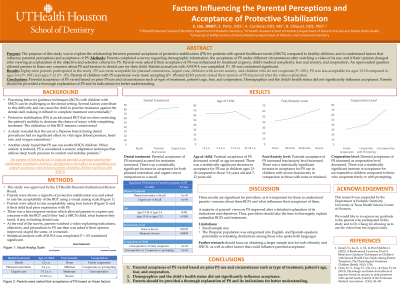Special Health Care Needs
83 - Factors Influencing the Parental Perceptions and Acceptance of Protective Stabilization

.jpg)
Sung Yeon Lim, DMD (she/her/hers)
PGY-2 Pediatric Dental Resident
University of Texas Health Science Center-Houston
University of Texas Health Science Center-Houston
Houston, Texas, United States
Brett T. Chiquet, DDS, PhD (he/him/his)
Professor and Chair, Department of Pediatric and Community Dentistry
University at Buffalo School of Dental Medicine
University at Buffalo School of Dental Medicine
Buffalo, New York, United States- BA
Bhavini Acharya, BDS
Pediatric Dentistry Graduate Program Director
University of Texas Health Science Center-Houston
Houston, Texas, United States
Presenting Author(s)
Research Mentor(s)
Program Director(s)
Purpose: The purpose of this study was to explore the relationship between parental acceptance of protective stabilization (PS) for patients with special healthcare needs (SHCN) compared to healthy children, and to understand factors that influence parental perceptions and acceptance of PS.
Methods: Parents completed a survey regarding demographic information, the acceptance of PS under different circumstances after watching a video of its use, and if their opinion changed after viewing an explanation of the objective and selection criteria for PS. Parents were asked if their acceptance of PS was influenced by treatment urgency, child’s medical complexity, fear and anxiety, and cooperation. An open-ended question allowed parents to share any concerns about PS and barriers to dental care for their child. Statistical analysis with ANOVA was completed. P < .05 was considered significant.
Results: Eighty-nine parents participated in the study. PS was more acceptable for planned restorations, urgent care, children with severe anxiety, and children who do not cooperate (P < .001). PS was less acceptable for ages 13-18 compared to ages 3-6 (P < .001) and ages 7-12 (P < .05). Parents of children with PS experience were more accepting (P < .05) and 42/89 parents stated their opinion of PS improved after the video explanation.
Conclusions: Parental acceptance of PS varied based on prior PS use and circumstances such as type of treatment, patient's age, fear, and cooperation. Demographics and the child's health status did not significantly influence acceptance. Parents should be provided a thorough explanation of PS and its indications for better understanding.
Identify Supporting Agency and Grant Number:

.jpg)